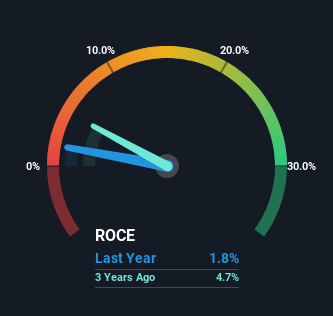- United States
- /
- Software
- /
- NYSE:MLNK
The Returns On Capital At MeridianLink (NYSE:MLNK) Don't Inspire Confidence
Ignoring the stock price of a company, what are the underlying trends that tell us a business is past the growth phase? A business that's potentially in decline often shows two trends, a return on capital employed (ROCE) that's declining, and a base of capital employed that's also declining. This combination can tell you that not only is the company investing less, it's earning less on what it does invest. In light of that, from a first glance at MeridianLink (NYSE:MLNK), we've spotted some signs that it could be struggling, so let's investigate.
Return On Capital Employed (ROCE): What Is It?
For those that aren't sure what ROCE is, it measures the amount of pre-tax profits a company can generate from the capital employed in its business. To calculate this metric for MeridianLink, this is the formula:
Return on Capital Employed = Earnings Before Interest and Tax (EBIT) ÷ (Total Assets - Current Liabilities)
0.018 = US$16m ÷ (US$968m - US$72m) (Based on the trailing twelve months to September 2024).
Thus, MeridianLink has an ROCE of 1.8%. In absolute terms, that's a low return and it also under-performs the Software industry average of 8.2%.
Check out our latest analysis for MeridianLink

Above you can see how the current ROCE for MeridianLink compares to its prior returns on capital, but there's only so much you can tell from the past. If you'd like, you can check out the forecasts from the analysts covering MeridianLink for free.
The Trend Of ROCE
There is reason to be cautious about MeridianLink, given the returns are trending downwards. To be more specific, the ROCE was 6.0% four years ago, but since then it has dropped noticeably. And on the capital employed front, the business is utilizing roughly the same amount of capital as it was back then. This combination can be indicative of a mature business that still has areas to deploy capital, but the returns received aren't as high due potentially to new competition or smaller margins. If these trends continue, we wouldn't expect MeridianLink to turn into a multi-bagger.
The Bottom Line On MeridianLink's ROCE
In the end, the trend of lower returns on the same amount of capital isn't typically an indication that we're looking at a growth stock. And long term shareholders have watched their investments stay flat over the last three years. Unless there is a shift to a more positive trajectory in these metrics, we would look elsewhere.
MeridianLink does have some risks though, and we've spotted 2 warning signs for MeridianLink that you might be interested in.
While MeridianLink isn't earning the highest return, check out this free list of companies that are earning high returns on equity with solid balance sheets.
New: Manage All Your Stock Portfolios in One Place
We've created the ultimate portfolio companion for stock investors, and it's free.
• Connect an unlimited number of Portfolios and see your total in one currency
• Be alerted to new Warning Signs or Risks via email or mobile
• Track the Fair Value of your stocks
Have feedback on this article? Concerned about the content? Get in touch with us directly. Alternatively, email editorial-team (at) simplywallst.com.
This article by Simply Wall St is general in nature. We provide commentary based on historical data and analyst forecasts only using an unbiased methodology and our articles are not intended to be financial advice. It does not constitute a recommendation to buy or sell any stock, and does not take account of your objectives, or your financial situation. We aim to bring you long-term focused analysis driven by fundamental data. Note that our analysis may not factor in the latest price-sensitive company announcements or qualitative material. Simply Wall St has no position in any stocks mentioned.
About NYSE:MLNK
MeridianLink
A software-as-a service company, provides software solutions for banks, credit unions, mortgage lenders, specialty lending providers, and consumer reporting agencies in the United States.
Adequate balance sheet and overvalued.
Similar Companies
Market Insights
Community Narratives


Recently Updated Narratives

Proximus: The State-Backed Backup Plan with 7% Gross Yield and 15% Currency Upside.

CEO: We are winners in the long term in the AI world

Early mover in a fast growing industry. Likely to experience share price volatility as they scale
Popular Narratives


MicroVision will explode future revenue by 380.37% with a vision towards success


The company that turned a verb into a global necessity and basically runs the modern internet, digital ads, smartphones, maps, and AI.



